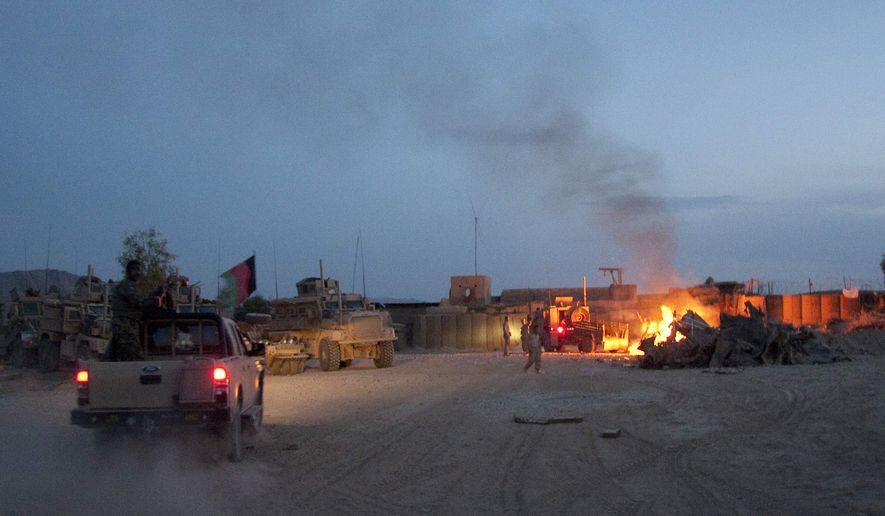OPINION:
It’s time for some members of Congress to put aside politics and focus on legislation that will help our veterans who have been exposed to toxins resulting from burn pits that were used in Iraq, Afghanistan and elsewhere. The pits were used to burn various materials ranging from garbage, human waste, chemicals and paint to lubricants, ordnance and medical waste — all often ignited with jet fuel.
Unfortunately, what has resulted from these burn pits has been referred to as the Agent Orange of our time in Southwest Asia. We have seen — and continue to see — a wave of rare cancers and other illnesses suffered by those who have served in those theaters long after being exposed to the toxins from the burn pits. Some veterans, long after their service in uniform, have already died from those illnesses.
For example, of the more than 2.5 million service members who served in the War on Terror, 43,000 have filed claims with the Veterans Administration for cancer. More than 780,000 have filed a claim for respiratory conditions.
Legislation was introduced to address this issue and provide health care and benefits for veterans who have developed illnesses from burn-pit smoke. The legislation was called The Promise to Address Comprehensive Toxics Act — referred to as The PACT Act.
The PACT Act is a far-reaching piece of legislation that would go beyond illnesses and cancers related to smoke from burn pits. The legislation would also provide benefits for veterans who faced radiation exposure during deployments throughout the Cold War. It also adds some resultant illnesses related to exposure to Agent Orange during the Vietnam War. Additionally, those who served in Cambodia, Laos and Thailand would be covered for the first time under Agent Orange policies.
Sadly, the word “promise” in the legislation has been lost by some members of Congress. Instead of addressing the problem and assisting our military veterans who volunteered to go into harm’s way and developed serious health problems, the legislation has become ensnarled in procedural issues. What some anticipated to be a “slam dunk” for the PACT Act has become a victim of partisan politics.
The legislation passed the Senate in June very comfortably — 84-14. It moved on to the House in July and passed 342-88 with bipartisan support. Some technical corrections had to be made and had to go back to the Senate for another procedural vote. But lingering funding concerns for the bill led 25 Republican senators to no longer support it. The central issue was a budgetary fight about whether to categorize the funding as mandatory or discretionary for toxic exposure.
Some political observers say the Republican action was retaliation for plans announced by Democrats for a comprehensive budget reconciliation measure. Republicans had pledged to oppose the plan.
Mandatory versus discretionary spending should not be the issue — nor should partisan fighting over issues not related to the issue at hand. When a military member voluntarily agrees to serve his or her country, we have promised we would take care of them beyond their service. To abdicate this responsibility is a violation of a contract our nation has made to those who have fulfilled their contract to protect and defend our country.
For Congress to fail our veterans as they have is more than mere disappointment. It’s an outright scar on our national integrity and honor. Our veterans clearly deserve better. They are tired of waiting for solutions.
Is it any wonder that in a recent Gallup poll, only 7% of respondents said they had confidence in Congress?
Comedian and activist Jon Stewart, who has been a passionate supporter of those exposed to toxic burn pits, referred to the Senate Republicans who voted against the legislation as a “gut punch.”
“I’m used to lies. I’m used to hypocrisy. I’m used to their cowardice,” Mr. Stewart said in comments about the legislators. “I’m not used to the cruelty, the casual cruelty … a bill they had fought for, for more than a decade.”
In a very emotionally charged press conference, Mr. Stewart called out Senate Minority Leader Mitch McConnell. Mr. Stewart said Mr. McConnell lied to veterans by saying, “We’ll get it done,” but then voted against the bill. The activist said the legislation “gives the veterans health care, gives them benefits, lets them live from becoming an addict and keeps veterans from committing suicide.”
The Military Officers Association of America, a nonprofit military advocacy organization, has supported legislation to address toxic exposure for several years. MOAA feels the Senate needs to come together to find a way to pass the PACT Act as quickly as possible. The time for budgetary fights and politics can wait. The Senate should not leave for the August recess until the PACT Act is passed.
Our veterans did not hesitate when we asked them to serve our country and go to war. The Senate should do the same to honor their sacrifice and service. It’s time for Senate members to remember the word “Promise” in the legislation.
• Tom Jurkowsky is a retired Navy rear admiral who served on active duty for 31 years, including service during the Vietnam War. He is a board member of the Military Officers Association of America, a nonprofit military advocacy organization that supports a strong defense. He is also the author of the book “The Secret Sauce for Organizational Success: Communications and Leadership on the Same Page.”




Please read our comment policy before commenting.